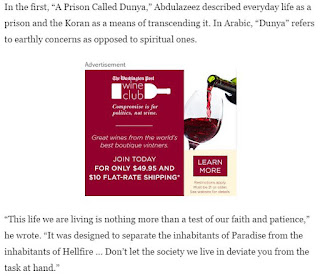 |
| http://www.dailymail.co.uk/femail/article-2525253/Model-Sally-Gifford-Piper-star-hit-Photoshop-video-gets-fat-Santa-makeover.html |
A new trend is worrying business owners. This year store-bought gifts are not being returned to shops or gift-givers. Consequently, people's homes are filling up with an alarmingly large number of white elephants waiting anxiously for re-gifting. Marketing gurus and psychologists have united in trying to discover why this hoarding craze is filling up garages, attics and basements. One observer notes that re-gifting of white elephants is passe. Americans used to have a love affair with false sentiment, especially among their closest friends who got the unwanted crap. Giving the gift that keeps on getting given seems to have lost its luster.
Confidence Rises to Five-Month High as Americans Cheer Discounts
Shoppers entered stores congratulating one another with high-fives and loud cheers and whistles as they bought up all the crap they could find to fill their closets, garages and rented storage units. "Sales are the reason to buy," one shopper said. "It inspires me and gives me the inner strength to meet my obligations and excel in everything I do." Skeptics questioned the strategy, wondering what would happen if prices went back to their normally inflated levels.
Brazil Grapples With Mosquito-borne Virus
Exciting matches between a behemoth state and a microscopic one unfortunately weighed in favor of the viruses because Brazil, the fourth largest country in the world, had no hands small enough to grab hold of the little buggers. One disgruntled fan at an internationally televised match complained about the inability to see what was really going on and how his favorite virus fared against a goliath. The promotion for this event, he said, "was just crap."
Wild crows use tiny cameras to film themselves using tools
There was loud kawing and crowing as the birds took pictures of their fellow workers manipulating their new tools. But it all went south when the birds protested that they couldn't upload their photos to Instagram and Facebook. They complained they had no way to pay with a credit card for their internet service.
The black (and decker) crows: They use tools
But the white ones (crows) haven't learned how yet, because they say they need electricity to power their tools. The black crows figured out a way to sit on power lines and plug their tools into the grid. Unfortunately, they haven't found a extension cords long enough to do anything useful.
Brain dead" man wakes after father's threat to shoot medics
"I was just having this dream of world peace when dad, as usual, woke me up with his NRA rant," said the gun-toter's son, an advocate for banning all firearms. He told Fox News that he was going back into a coma as a protest until enough people got shot that people like his father went back on their meds, or attended civilizing classes at the Leave-Others-the-Fuck-Alone school for big boys with crap for brains.
Police say they seek 400-pound bearded woman in stabbing
A case of hide-and-seek gone wrong--police claim assailant is not playing fair by hiding where they can't see or recognize her. "It is as if she disappeared into thin air," said one policeman who asked to remain anonymous. He said she failed to reveal herself even after he repeatedly called "Olly olly oxen free." He threw up his hands in frustration saying, "This crappy game sucks."
Man donates $15G Rolex to Newburyport Salvation Army
"Wonder of wonders," said the Army volunteer who stood outside Walmart collecting donations for the poor and needy. However, the Army Commander is now at a loss as to what to do with the expensive donation. He said no one on the street needed such an expensive watch and no one in any Salvation Army store could afford to buy one. He said, as a contribution to the cause of giving, he would wear the watch for the upcoming spring golf tournament to show how successful past charitable campaigns had fared.
Queen Gives Traditional Christmas Day Message
(If you heard it last year and the year before, you can probably skip it. Same old. . . .)
Treat 'normal' blood pressure to save lives: study urges
A new life-saving advisory for healthy people has been touted by American doctors--take meds before your non-existent symptoms and conditions appear. The wellness strategy apparently grows out of foreign policy think tanks, institutions currently having exhausted anything really important to think about. They seem to be extending the logic of their most successful policy advice ever, "preemptive strikes to eliminate unwanted civilians in undeclared wars."
Why The Christmas Full Moon Is Even More Important Than You Thought
The puzzling appearance of the full moon on Christmas signals that earthly phenomena such as tides and increased incidence of menstrual cramps will make hell for seamen who wish to dock for the holidays and enjoy quality family time with long suffering wives such as have been portrayed in sentimental nineteenth century novels of adventure and once-a-decade marital unions . . .
Ran out of steam but feel free to continue by gathering the headlines and letting the silliness flow, An antidote to all the weird and unsettling news, and non-news.














